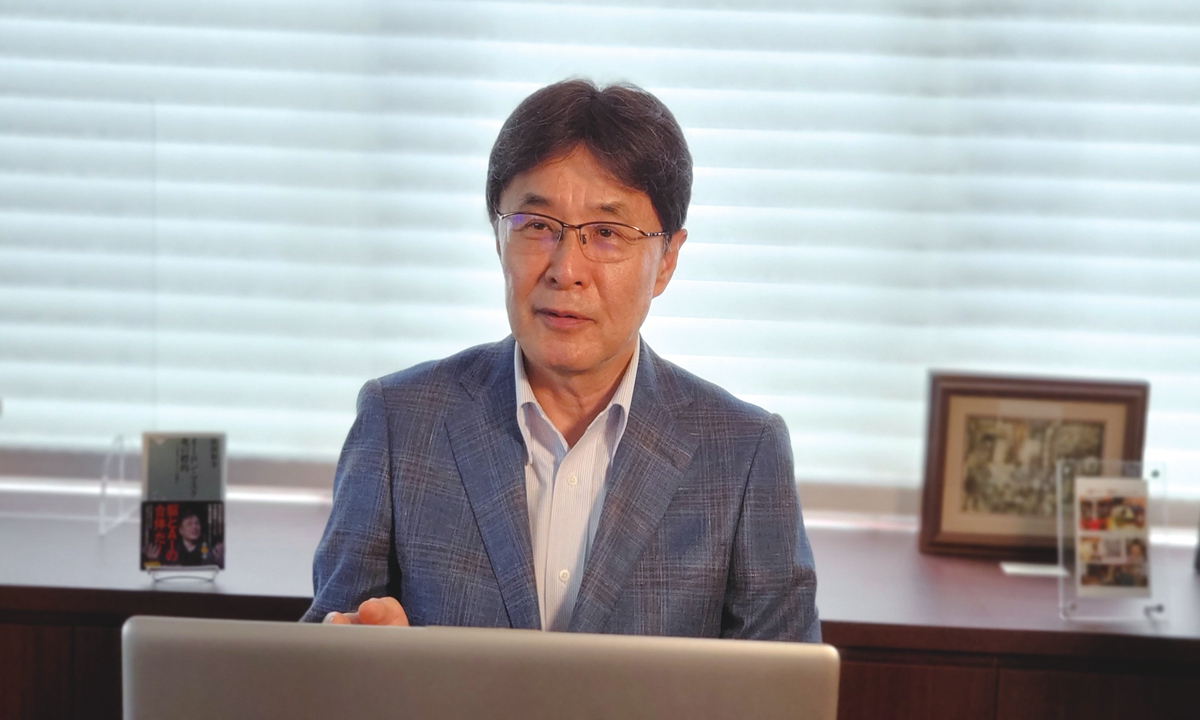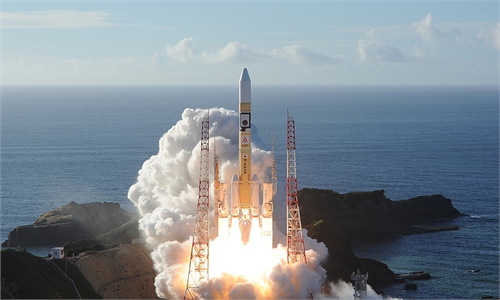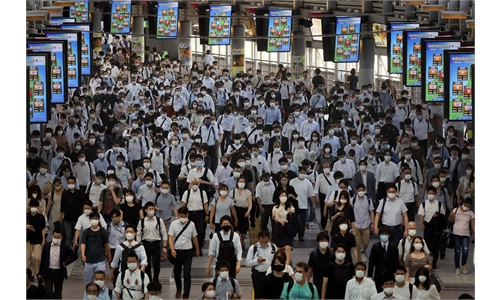Free, democratic nations can't compete with CPC in poverty eradication efforts: former Japanese politician

Kazuyuki Hamada Photo: Courtesy of Hamada
Editor's Note:This year marks the centennial anniversary of the founding of the Communist Party of China (CPC). Japan, a Chinese neighbor with deep cultural ties with China, has witnessed China's changes in the past century. What experience could Japan learn from China? Why is it difficult for the West to objectively interpret CPC? Kazuyuki Hamada (Hamada), president of the Research Institute for Future Technologies, former parliamentary vice minister for foreign affairs of Japan shared his views with Global Times (GT) reporter Xu Yelu. When it comes to some Japanese politicians' rhetoric which challenged China's red-line on the Taiwan question, Hamada stressed, it is against national interest for both Japan and the US to be entrapped into the Taiwan question and this should be resolved by the two sides (across the Taiwan Straits) peacefully in due course.
GT: In one of your previous interviews, you mentioned that some developed countries, such as the US and Japan, have failed to take effective measures to deal with global issues such as increasing natural disasters caused by global warming, shortages of energy and resources, and failure to effectively control the COVID-19 pandemic. But China succeeded. What do you think Japan can learn from China's successful experience? Why did China make it while some developed countries didn't?
Hamada: Yes, the world is faced with various challenges such as the COVID-19 pandemic and escalating natural disasters. Despite the global endeavor to contain the spread, new variants of coronavirus are appearing one after another. Although the US is experiencing the worst situation in terms of infections and deaths, there is no country which is totally free from this global pandemic.
China is recovering and displaying the resilience and is now helping other developing countries. The world has been impressed by China's approaches in containing the spread of the deadly virus by lockdowns and quarantine measures. The leadership of China has been effective in securing budgets and human resources at the earliest occasion.
To keep criticizing any country for the origins and spread of the COVID-19 has been and will be unproductive. So-called "China Bashing" initiated by the US is only counterproductive. Washington seems to be enslaved by the ideological threat. The time and energy should be focused on open-sharing of the relevant medical and scientific information beyond national boundaries.
GT: You have once published an opinion piece that the relationship between Japan and the US is always dominated by China-US relations. Could you please elaborate on this point? Recently, Japan has been following the US in many China-related issues, such as the Taiwan question. Do you think Japan should get involved in the Taiwan Straits? What result will Japan face if it does so?
Hamada: Japan and the US are bound by the bilateral security treaty. The US has an obligation to protect and fight for Japan in the case of external attacks on Japan. In exchange, Japan is providing military bases for the US together with financial support. Although Japan's relationship with China is much longer and bigger historically and economically than that with the US, Japan is much more dependent on the US in political and security fields.
As China is increasing economic and technological development and is now catching up and surpassing the US in various fields, American political leaders, regardless of their party affiliation, are regarding China as the most serious challenger against the US. Therefore, both Trump and Biden administrations are demanding Japan to stand up and work together to contain the expanding Chinese influence. However, both American and Japanese economic and business interests are so deeply connected with China. American and Japanese business communities are united in supporting the cooperative relationship with China.
For China, the Taiwan question is one of its domestic affairs, clearly defined by both American and Japanese treaties signed with China when diplomatic relations were established. It is against national interest for both Japan and the US to be entrapped into the Taiwan question. This should be resolved by the two sides peacefully in due course.
Although the Biden administration is trying to invite Japan to form a security alliance against China in the name of Taiwan question, it is simply following the military-industrial complex which has been exploiting the security tension over Taiwan and scaling up the sales of their military equipment to Taiwan. Japan is well aware of the American business interests and also China's preserved security stance.
If China and the US are to exchange fire on Taiwan, it would destroy not only China and the US but also the Japanese economy. Japan is well aware of such a dangerous course. Therefore, Japan should keep distance from the Taiwan question and maintain lip-service to American hardliners over this issue.
GT: Election politics has long been regarded as an effective incentive and accountability system. But the COVID-19 pandemic has shown that such systems do not hold officials accountable effectively and even breed dereliction of duty. What do you think of that?
Hamada: Election politics have both positive and negative elements. Voters could express their voices through elections but such occasions are very limited. Under emergency situations like the COVID-19 pandemic, there is no chance for voters to convey their ideas to the politics through elections. Even Prime Minister Suga had to abandon his responsibility by stepping down from the top leadership position under mounting criticism due to his ineffective countermeasures against the pandemic. The process of selection of Japanese prime minister is only through the vote of LDP parliamentarians and registered party members. General public has no voice in choosing the top leader of the state. This is a very indirect method and unconvincing way to select the prime minister who controls the destiny of the nation.
In order to be elected, politicians are obliged to secure local interests such as bringing national budgets for his or her constituency. As a result, any pressing national and international affairs are tended to be put aside or ignored. Constituency first is the mentality of most politicians in Japan. The current and ongoing pandemic has revealed the most serious weakness of election politics. National policy makers including Prime Minister Suga himself have failed in introducing effective measures against the pandemic.
GT: In recent years, the Western narrative of the CPC has always avoided to talk about the positive role of CPC in China's social progress and world economic development. In your opinion, why is it difficult for the West to objectively interpret CPC?
Hamada: For most Western countries, political and economic problems are getting out of control. The sad reality is 1 percent of super-rich and 99 percent of ordinary and poor population. Crimes and disasters are disintegrating many advanced Western nations. Under the pressures and interference of the ruling political powers, media and policy experts are forced to find some excuse for such miserable situations. One of the easiest ways to distract people's frustration is to find a scapegoat. They found China is just fit for such a role of convenient scapegoat.
Under the CPC's initiative and leadership, China achieved unparalleled success to overcome absolute poverty in the rural areas of China. Naturally, Western countries are trying to downgrade China's efforts and accomplishment to maintain their superficial supremacy.
GT: I noticed that you are very familiar with China's five-year plans. This is one of the obvious differences between the Chinese system and the Western system. But this advantage is often misunderstood in the West. What is the best way to explain China's advantage in long-term planning to the West countries?
Hamada: The best way to appeal to the West of China's advantage of long-term policy plans is to continue a dialogue and exchange on various levels of people, business, educational institutions and governments. Individual visits and communications are vital in promoting mutual understanding. Each country has its own history and culture. We must respect difference and diversity.
Whether you are Chinese or Japanese, we are in the same boat and same destiny to be living on this planet at the time of human history in 2021. In this sense, we are same. We all belong to the same family of human beings. Standing on such a wide and friendly position, we must continue our efforts to know and learn the differences through which we will find a common ground to work together.
GT: What fields do you think China and Japan can learn from each other in terms of national governance models?
Hamada: China and Japan have a long history of human contact and cultural exchanges. Japan learned so many advanced ideas and knowledge from China through almost 2000 years of communication. If China and Japan could work together, overcoming small differences in politics and security fields, China-Japan partnership could find a solution to many challenges faced not only by the two countries but by the whole world such as energy, environment, health, IT, terrorism and so on.
There are countless areas of common interest among Chinese and Japanese.
Both the governments of China and Japan could promote innovative approaches to the natural ocean resources including fish, seaweed, methane-hydrate and power generation. Inter-governmental talks and agreements over the open and free sea-lane should be upgraded by China-Japan initiative.



